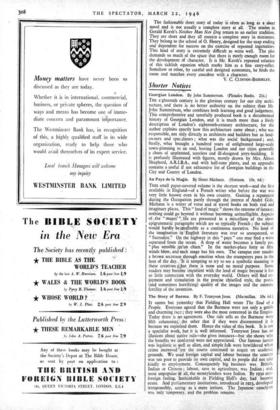The Story of Burma. By F. Tennyson Jesse. (Macmillan: lOs.
6d.)
IT seems but Yesterday that Fielding Hall wrote The Soul of a People. Everyone agreed that the Burmese were not only a gentle and charming race ; they were also the most contented in the Empire. Today there is no agreement. One side tells us the Burmese were fifth columnists;-_the other that if they were discontented it is because we exploited them. Hence the value of this book. It is not a specialist work, but it is well informed. Tennyson Jesse has no illusions about native rule—she gives instances—but she shows why the benefits we conferred were not appreciated. Our famous justice was legalistic as yell as alien, and simple folk were bewildered when crime increased "yet the courts continued to acquit on academic grounds. We used foreign capital and labour because the country was too poor to provide its own capital, and its people did not take kindly to employment. Consequently big business was British, Indian or Chineselabour, save in agriculture, was Indian ; and, most unpopular'ef 111, the moneylenders were Indian. By r930 anti- foreign feeling, linthinkable in Fielding Hall's day, had become acute. And parliamentary institutions, introduced in 1923, developed irresponsibly, acting as a mere irritant. The Japanese cataclysm was only temporary, and the problem remains.






























 Previous page
Previous page